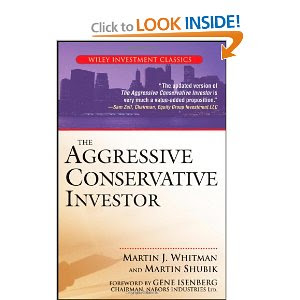Martin Whitman founded Third Avenue Value Fund some twenty years ago. Over that time period, the fund has beaten the returns of the S&P 500 by several points annually. In The Aggressive Conservative Investor, Whitman collaborates with Martin Shubik to discuss a concept that they call “safe and cheap” investing.
This chapter continues the theme of the last chapter, where a number of company and securities attributes are discussed, with the idea that on their own each attribute is neither a positive or a negative. In proper context, however, each attribute can both be quite positive or quite negative, depending on the circumstance.
For example, high debt loads are sometimes viewed as risky and negative. On the other hand, they can also be a sign of management employing a cheaper source of capital (e.g. in a safe, stable utility company for example) or a result of management having re-invested in the business to stay ahead of the competition.
Another attribute discussed is management incentives. Obviously, some level of incentive keeps management focused and aligned with interests of shareholders. However, at some other level, shareholders are simply being robbed, as the payouts simply act as a security that is senior to shareholder claims.
Cyclical companies in competitive industries are often shunned by long-term investors. However, in the authors’ opinions, these industries tend to attract the brightest management teams. Furthermore, these companies are often capitalized very safely (they must, if they wish to stay alive), and so investments in such companies can actually be safer than investments in what seem like stable companies with poor managements and tons of debt.
A number of other attributes with similar positive and negative effects are discussed, including large cash positions, conglomerates vs focused companies, companies going public or private, and the effects of regulation.




